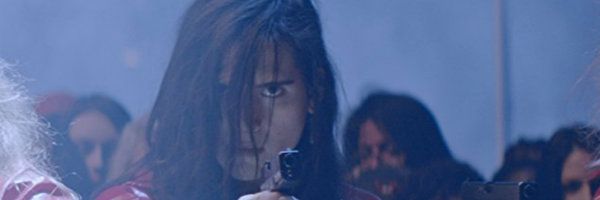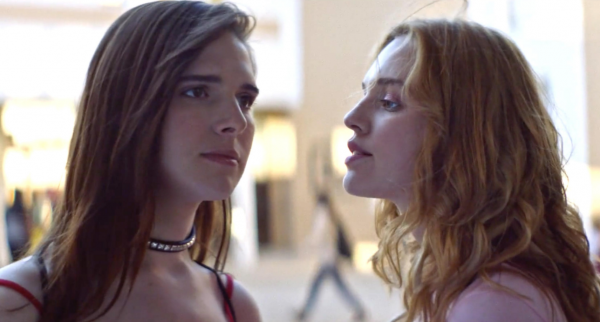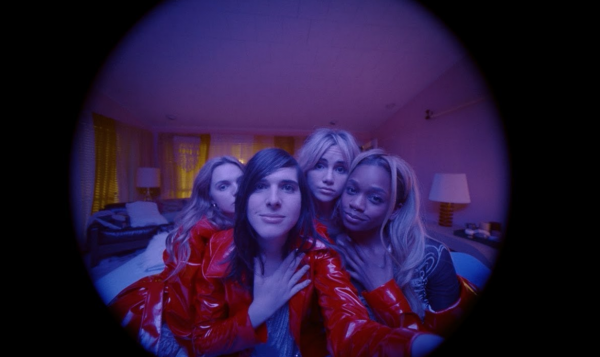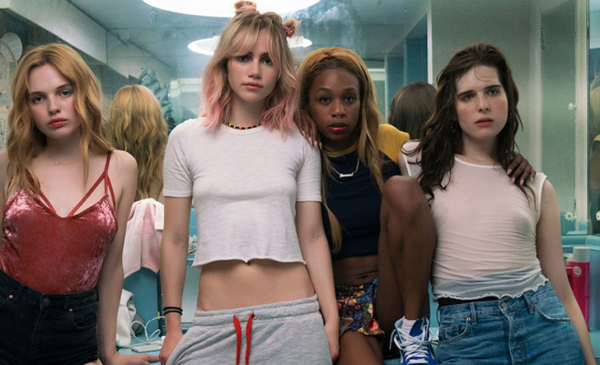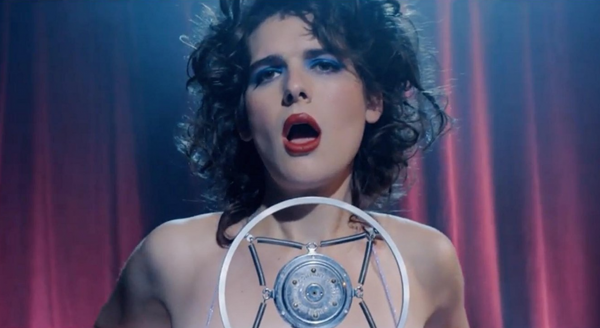On January 22, following a screening of Assassination Nation at the Sundance Film Festival, I tweeted, "Hari Nef really impressed me in this film." Well, it turns out, I wasn't the only one. Sam Levinson's femme-powered revenge movie left Park City with the biggest deal of the festival ($10 million to NEON), while Nef emerged as the film's breakout star. That has little to do with the fact that she's transgender, and everything to do with her talent, which is evident to anyone who sees Assassination Nation.
The film follows four teenage girls whose small town of Salem is rocked by a malicious data hack that exposes everyone's secrets, thrusting the town into chaos. It's an empowerment story featuring girls with guns and no shortage of targets. Seriously, the movie even opens with a trigger warning and gets even more provocative from there.
Nef tackles these hot topics head-on, from the fact that the film hails from a straight, white, male director, to working with Levinson to address those sensitive issues that would benefit from the perspective of a young woman (and a trans actress). Nef grew up in Newton, Massachusetts where she attended public high school before enrolling at Columbia University in New York City, where she began making a name for herself as a fashion model. She was really the only choice for Collider's Up-and-Comer of the Month this September, as Assassination Nation has been expanding into more theaters thanks to strong buzz and positive word of mouth.
As Hollywood works towards being more inclusive, there's no question that a fresh wave of diverse talent is coming, and Nef is among those leading the charge. I hope you enjoy our conversation, during which she reveals which Shakespeare characters she'd like to play, and which actress has earned her eternal admiration. Without further ado, meet Hari Nef. You'll be hearing a lot more about her in the coming years, I have no doubt.
Collider: What sparked your passion for acting and made you decide to get into this crazy business?
HARI NEF: Well, it was kind of the first thing I ever liked. It was the first thing I liked to watch other people do, and then when I gave it a shot around the time I was 5, doing children’s theater at the Jewish Community Center, I realized that I enjoyed doing it as well. I had family who exposed me to all sorts of different media involving actors -- films, theatrical productions touring through Boston. My grandparents, particularly my mother’s parents, were huge fans of all the arts, and they took me to these shows and exhibits at a very young age, so I was just immersed in it. Then I’d come home and watch my Disney VHS tapes, and there were a couple of more mature videotapes mixed in from my mother’s collection that I would kind of steal and watch. I remember, mixed in with the usual Disney fare, my Mom had a copy of Victor Victoria and she had Titanic and she had A Chorus Line, but it's not like my parents were film buffs and I grew up around artists. I'm kind of the artsiest person in my family, if you want to call it that, so anything I could get my hands on, I did.
I was also using a computer and playing video games at a very young age, especially role-playing games where you're invited to take on the identity of a different person and move through an immersive world that has a linear story. I almost felt more engaged with those games than I did with just watching films or television shows because I was controlling the story and taking part in it. So I think my love of all different kinds of media was what eventually led me to try it out for myself.
But I didn’t act professionally until I was 22, so up until then it was just academic programs and training. I majored in drama and theater arts at Columbia and was always in acting studio, but that was a liberal arts degree, not a bachelor of arts degree, so I didn't have a traditional conservatory training. There was a lot of reading and a lot of writing involved, and only about 30 percent of my classes were directly theater-related. The rest that I needed to take to graduate were not theater-related, so it was more of a diverse education.
Tell me about the audition process for Assassination Nation and how Sam Levinson discovered you for this role.
NEF: I encountered the script through a friend who was going out for another role. I’m actually not sure which. They sent me the script and said, 'I’m auditioning for this thing and I feel like you need to play this girl.' And I asked her about the film, and she said this guy Sam Levinson had written this film about four teenage girls, so I looked him up and was like, 'oh, this guy wrote a film about four teenage girls? This can't possibly be any good.' And then I read it and it was good. In fact, it was great. I emailed my agents immediately and they said that they knew this was casting but that they weren't casting for role of Bex just yet, but that when they were, they would contact me. I was contacted by casting through my agents, so I went in and did the audition and then the callback. My callback was actually the day after the 2016 presidential election, so with some of those tougher, more dramatic scenes that Bex has, I didn’t have to push as hard for those as I might have on another day. Sam and I bonded pretty instantly and I got the part.
Did you have to chemistry read with the other girls to see if you meshed well together and had chemistry onscreen?
NEF: No, there were no chemistry reads, and that, I felt, was a risk, because the dynamic between these four girls is so specific and integral to rooting and and grounding the film with heart, so when we met in New Orleans, there was this question of whether or not we would mesh. Our first night there, Sam told us to go out, get into trouble and have fun -- it was the middle of Mardi Gras -- so that's exactly what we did. The bonding was fairly instantaneous and we had so much fun together. Now I have three lifelong friends. Four if you count Sam.
I've seen this film described as akin to the Salem Witch Trials for the digital age. Is that you viewed the story? I'm also curious what you made of Bex's on-the-DL relationship with the school jock.
NEF: I feel like this film is best described as an American film and a film about America at this moment. The Salem Witch Trials set a historical precedent, more of mass hysteria in the United States, that has been recycled periodically throughout the history of the country. whether it was Communists in the '50s, or Muslims around the beginning of the 21st century. The people of the United States periodically have latched onto certain groups, or certain types of people at certain points, and persecuted them specifically, blaming them for generalized issues, misfortunes and troubles that may or may not have anything to do with the people who are being persecuted. So in this film, it all comes down on these four teenage girls. I recently read a critic describe these four characters as an embodiment of 'this is the future the [inaudible] wants' and I thought that was kind of funny. I'm not sure I agree with it, but I can see the perspective there, sort of in a humorous way.
When it comes to Bex, I feel as though the things she deals with, while specific to her experience, are part of a much longer and more extensive conversation about desire and what kinds of women are appropriate and dateable and claimable as partners. Pretty much any girl who deviates from the sort of traditional Barbie ideal that has persisted in our country for as long as I can remember. Any girl who's apart from that in any way is going to come up against some sort of stigma when it comes to dating, particularly dating somebody who has more social privilege than she does. So I feel as though Bex's experience is a microcosm of a much larger, more prevalent thing that millions of women deal with. I think Assassination Nation pinpoints who makes these rules, who enforces these rules, and how they enforce these rules, as well as how the enforcement of these rules is persecution, and the rules themselves are oppression.
Did you work with Sam to find the character of Bex and hone it in the weeks leading up to production?
NEF: Yeah, as soon as I got the part, Sam sent an extremely warm, extremely touching email about how grateful he was that I was onboard for the project and how open he was to anything I had to say, anything I felt, anything I experienced, anything I thought about the script or about something that happened on set, or would happen on set at that point. He said I could come to him and talk to him about absolutely anything, and that he was dedicated to making sure I felt good about the way this character was being represented, and how I was going to work towards that as a collaborator on set. I immediately responded with a close reading of the character in the script, pinpointing just a couple things that I had questions about, and we had discussions about them. There were certain things and insights that I gave Sam that wound up in later drafts of the script, almost copy-and-pasted in some ways. For the sake of the film and the sake of protecting my process with Sam, I'd rather not go into specifics, but the reason that this film works as a representation for diverse teenage girls, written and directed by a white man, is because he put the reins in our hands, more or less. He wasn't strict, he wasn't rigid, he allowed us to go off script, and he allowed us full approval over the way we were being represented in the film. He submitted to us in that way, which I believe is exemplary of how a person like Sam has to work if he wishes to tell these kinds of stories. I don't think it's impossible, and I don't think that anyone should be disqualified from telling any kind of story. There are just a certain set of responsibilities come when certain kinds of people want to tell certain kinds of stories, and working with Sam in that way disabused me of a lot of prejudices I had about representation in storytelling. It was a collaboration that a more cynical version of myself may not have thought possible, and yet my experience working on the film was comprised of the happiest month-and-a-half of my life, I would say. I had so much fun and felt so supported the whole time.
Are there any actors who you admire, or whose careers you’d like to emulate?
NEF: Yes. I would rather not drop names, just because as soon as you're a fan, you're a fan forever. I admire actresses who are willing to jettison the easy route toward exposure and commercial success as an actor in favor or a slow burn, choosing projects carefully, and building an artistic practice over time that feels specific to who they are as artists. I obviously understand that many actors need to act to survive, and not everybody is in a position to be super choosy about their roles, and I count myself lucky to have come from relative success in another industry -- fashion -- that gives me a cushion that allows me to actually be more choosy and specific about my acting roles. OK, fine, I'll give you one example. This is someone who I've had the pleasure of meeting and complimenting directly about this: Laura Dern. You look back at her career and you never cock your head and ask yourself why she took on a project. It always seems like something she wants to do. With her career, she has built something so strong and specific with so much integrity over a period of time, that it's allowing her to shine in all kinds of nuanced and fascinating roles well into a period of her career where actresses aren’t always afforded to do that. So I think that slow burn is something that pays off in the end, and I admire her artistry, and her taste, so much.
Do you have a dream role? Is there a part you’re dying to play?
NEF: I just watched Who’s Afraid of Virginia Woolf? for the first time, and I would love at some point in my life to play every woman in that play. There's Honey and Martha on stage. I watched the film version, but I now want to read Edward Albee’s dramatic text. That is one of the best dramas I've ever seen on film and I would love to bring that to life someday. I have my Shakespeare list, like, I'd love to play Lady Macbeth someday, or Ophelia. I'd probably play Ophelia like most people play Lady Macbeth, and I'd probably play Lady Macbeth like most people play Ophelia. I had to read those plays so many times in college that I sort of developed these very rigid ideas about how I feel and how I think about those characters. I'd love to play Madea in the Greek tragedy someday. I’m not so fascinated by these ingenue roles. I tend to gravitate towards women in plays or shows or films that are more chaotic or have something dire going on.
What's next for you, Hari?
NEF: Well, there is a film that I cannot discuss at the moment, and there is likely a play that I cannot discuss at the moment, but I'm very excited about these things. It looks like I'm going to working for next 6-9 months, and I've also been writing a little something of my own, so there are lots of little things that I've been scheming, and I'm excited, whether one of them comes true or all of them come true. One of them is happening, the other is probably happening, and the other one, who knows, but as long as I can work, I'll be happy. I'm just grateful to have the platform of this film to hopefully sling me forward into something that lasts and is fun. But I'm going to knock on wood and just take it day by day.

